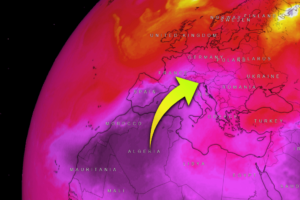A group of Swiss women are taking their government to the European Court of Human Rights (ECtHR) court over climate change.
With an average age of 73, they say the country’s climate policies are putting their health – and human rights – at risk.
KlimaSeniorinnen (Senior Women for Climate Protection) has accused the government of infringing on the right to life and health of elderly women.
After a six-year battle and being defeated in the Federal Court, Switzerland’s highest legal avenue, they have escalated the case to the ECtHR in Strasbourg.
Switzerland doesn’t deny that climate change can affect health but it argues that emissions can’t specifically be tied to the health of older women. And it says, climate action is a matter for politicians to decide.
The lawsuit has now been referred to the judges of the Grand Chamber, a court reserved for only the most important issues.
The verdict could have important repercussions not only for the 46 member states of the European Council but the whole world.
Why is KlimaSeniorinnen taking the Swiss government to court?
On 29 March, members of KlimaSeniorinnen are taking the train from Switzerland to Strasbourg in north-east France. That’s where their legal team, supported by Greenpeace Switzerland, will make their case at an ECtHR public hearing.
The group argues that Switzerland isn’t doing enough on climate protection and that the country’s climate policy is “clearly inadequate” for the Paris Agreement target of limiting global warming to 1.5℃.

The senior women say that if every country’s response was the same as Switzerland’s, global warming of up to 3℃ would hit by 2100.
The dossier of scientific evidence collected by KlimaSeniorinnen to support their case illustrates the impact of climate change on people’s health. It highlights how older people and women are particularly vulnerable.
They will argue in court that Switzerland has breached Articles 2 and 8 of the European Convention on Human Rights. These two Articles protect the right to life and the right to respect for private and family life.
Eight other governments – Romania, Latvia, Austria, Slovakia, Norway, Italy, Portugal and Ireland – have also joined the case. At least one echoes Switzerland’s calls for it to be dismissed with the Irish government saying states should be left to decide their own climate policies.
The Swiss government’s legal team reportedly told the court today that any prescriptive measures it issues would represent an overreach.
‘The political system is too slow’
Elisabeth Stern is one of the members of KlimaSeniorinnen heading to Strasbourg.
She first got involved in activism in the 1970s after realising the connection between world hunger and overconsumption in the Global North.
From there, she became interested in the peace movement and eventually the climate movement after a “wake-up call” on the effects of our planet’s changing weather in Zimbabwe in the 90s. After working for an environmental finance company for a number of years, Elisabeth retired.
“When I retired, it was just very clear I would have to be an activist. I just couldn’t be anything else,” she tells Euronews Green.

So she joined the KlimaSeniorinnen, a group of women in her age group fighting for the same cause. They had experienced the same pivotal political and historical events as her with many dedicating their entire lifetimes to activism.
Many of them have frail bodies, but their minds are so clear.
Elisabeth Stern
Member of KlimaSeniorinnen
“These women, they were just such an inspiration,” she explains.
“You know, many of them have frail bodies, but their minds are so clear. They were also activists all their life beginning with the anti-nuke movement, and the women’s movement.”
And joining the group even revealed some things the 74-year-old hadn’t realised were possible.
Growing up in a highly democratic country with plenty of chances to challenge the way things were being done, Elisabeth was surprised to learn that you could take your government to court.
But, she adds, it was clear that “the political system is still much too slow for what is required.”
What will the verdict of the Swiss climate case mean for Europe?
In Strasbourg, Elisabeth and the other senior women are hoping that a precedent can be set on whether climate protection is a human right.
It is the first time that the ECtHR will hold a public hearing to determine the extent to which a country like Switzerland must cut emissions to protect the human rights of its population. It is also the first climate case to come before the court’s Grand Chamber.
KlimaSeniorinnen believes the outcome could have much wider ramifications.
“This is the first time ever that a court has to decide on whether climate protection is a human right,” Elisabeth says.

She hopes they can look at the claim “without ideology” to determine whether Articles 2 and 8 of the European Convention of Human Rights have been breached.
If the court decides that climate protection is a human rights issue it has an impact on the other 46 states of the European Council. Any of these countries could also file a complaint, refer back to that verdict and say they want the same.
They would almost legitimise the unsatisfactory climate path that Switzerland and of course many other countries are on.
Elisabeth Stern
Member of KlimaSeniorinnen
“That’s what I hope for now. That they make that clear, they actually pass a clear decision, even maybe a decision that has a precedent for other states,” Elisabeth says.
But if they turn KlimaSeniorinnen down, she adds, it would be very tough to take.
“They would almost legitimise the unsatisfactory climate path that Switzerland and of course many other countries are on. That would be a really bad story.”
A pivotal historical moment for climate action
Whatever the outcome of the case, Elisabeth believes that in some ways they have already won.
When they started six years ago, very few people knew about the lawsuit. Now members of KlimaSeniorinnen are fielding multiple requests a day for interviews about the case and several hundred people are expected to gather in Strasbourg to support them.
Today the ECtHR will also hear a case from Damien Carême, the former mayor of Grande-Synthe in France. Similar to KlimaSeniorinnen, he is arguing that the French government hasn’t done all it can to cut emissions and therefore breached his human rights.
After the Court’s summer break, it will hear another case from young activists claiming Portugal and 31 other governments are infringing on their human rights by failing to act on climate change.
Once these cases have been heard, the ECtHR is expected to rule on all three.
With the number of cases growing, the decision on whether action on climate change is a human rights issue could be a historic moment.
Source : Euro News











Add Comment